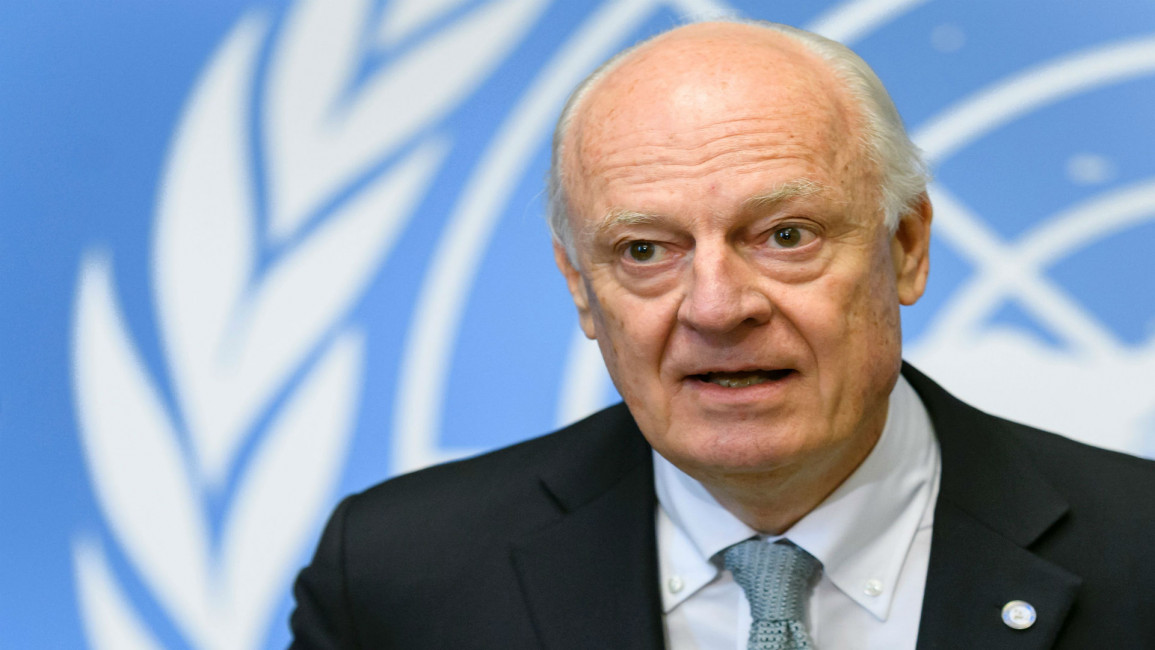Syria UN envoy warns warring parties against 'illusions of victory' ahead of peace talks
The United Nations is set to convene the next round of the Syrian talks in Geneva by the end of October or in early November, the UN mediator has told the Security Council.
"The time has come for the focus to return to Geneva, and the intra-Syrian talks under the auspices of the United Nations," said UN Special Envoy for Syria Staffan de Mistura, urging the regime and the opposition to participate in the talks without preconditions.
De Mistura said the regime should show a genuine interest in having negotiations about credible, inclusive local and central governance, a schedule and process for a new constitution, and UN-supervised elections.
For its part, the opposition should show its unity and readiness to speak in one voice, he said, urging opposition groups to seize the opportunity presented by Saudi Arabia to convene a conference for them to overcome differences.
"Let me caution both sides and their backers against illusions of victory or dreams of shortcuts," he said. "There is no substitute for an internationally supported process based on a comprehensive and inclusive approach that also helps Syrians to re-discover a modicum of trust and social cohesion after the bitterest of conflict."
Following the July round of the UN-facilitated talks, the envoy said the conference ended with incremental progress but no breakthrough.
Intra-Syrian talks focus on the "four baskets": a credible non-sectarian transitional government; a future constitution; early and free parliamentary elections within 18 months; and a united war against terrorism within Syria.
Cycle of violence
Also briefing the council on Wednesday on the humanitarian situation there, Under-Secretary-General for Humanitarian Affairs Mark Lowcock said: "Syria continues to face deep and difficult challenges, and the Syrian people remain trapped in a cycle of violence that must be broken."
Following a comprehensive UN review, Deir az-Zour and the 93,500 people in the city are being removed from the list of those besieged, he said, explaining that after three years of besiegement by the Islamic State group, Syrian regime forces in early September gained road access, marking the end of costly airdrops.
Now an estimated 419,920 people remain besieged in 10 locations across Syria. Of these, 95 per cent are besieged by the regime, two per cent by non-state armed groups, and three per cent by both non-state armed groups and the Syrian regime. "These sieges must be lifted," said Lowcock, who is also UN Emergency Relief Coordinator.
So far in September, 9,000 people in the three besieged towns of Foah, Kefraya and Yarmouk have been reached, and 25,000 people were reached in East Harasta, Misraba and Modira.
In total, under the August and September access plan, the UN has reached 280,500 of the 1.23 million people it requested to provide assistance to, he added.
The Syrian conflict began when the Baath regime, in power since 1963 and led by Assad, responded with military force to peaceful protests demanding democratic reforms during the Arab Spring wave of uprisings.
It triggered an armed rebellion fuelled by mass defections from the Syrian army.
According to independent monitors, hundreds of thousands of civilians have been killed in the war, mostly by the regime and its powerful allies. Millions more have been displaced both inside and outside of Syria.
The brutal tactics pursued mainly by the regime, which have included the use of chemical weapons, sieges, mass executions and torture against civilians have led to war crimes investigations.



